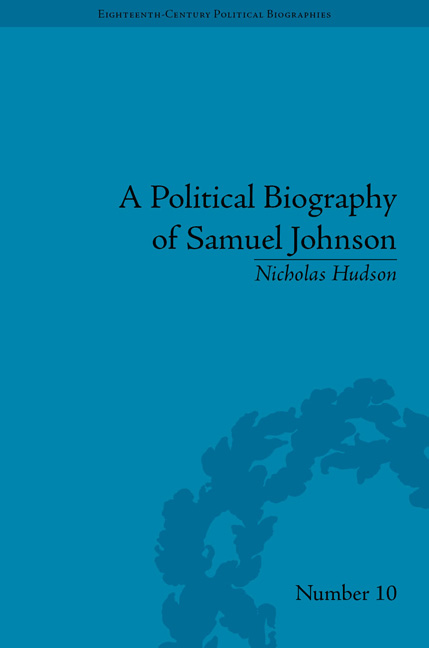Book contents
- Frontmatter
- CONTENTS
- Dedication
- Acknowledgements
- Note on the Text
- Introduction
- 1 Political Origins, 1709–36
- 2 The Patriot Opposition, 1737–9
- 3 An Independent Voice, 1740–55
- 4 The Seven Years War, 1756–63
- 5 Defender of King and State, 1763–70
- 6 Troubles of Empire, 1771–84
- Conclusion
- Notes
- Works Cited
- Index
1 - Political Origins, 1709–36
- Frontmatter
- CONTENTS
- Dedication
- Acknowledgements
- Note on the Text
- Introduction
- 1 Political Origins, 1709–36
- 2 The Patriot Opposition, 1737–9
- 3 An Independent Voice, 1740–55
- 4 The Seven Years War, 1756–63
- 5 Defender of King and State, 1763–70
- 6 Troubles of Empire, 1771–84
- Conclusion
- Notes
- Works Cited
- Index
Summary
The Political Culture of Lichfield
The cathedral city of Lichfield, where Johnson was born on 18 September 1709, in many ways epitomized the political tensions of eighteenth-century English politics. It was on the one hand a model of politeness and prosperity during a period when Britain remained under the control of a small elite while advancing towards being a great economic and imperial power. Although Lichfield had little industry until the nineteenth century, it was visibly prospering. Indeed, the fine house where Johnson was born on the market square, built by his father Michael, a bookseller and local worthy, attested to its well-being. The city's corporation built a new townhall, lighted the streets and planted gardens. The shallow water that surrounded the cathedral close, once described by Horace Walpole as a ‘bog’, was reshaped into an elegant lake. Called by Daniel Defoe in the early century ‘a Place of good Company, above all the Towns in this or the neighbouring Counties’, Lichfield produced or was home to some of the most eminent cultural figures of the century. Besides Johnson himself, the great actor and theatre-manager David Garrick came from Lichfield. Joseph Addison lived in Lichfield between 1683 and 1685 when his father was Dean of the Cathedral. The inventor Erasmus Darwin, grandfather of the great nineteenth-century biologist, settled there in 1756. Johnson had reason to call his hometown ‘a city of philosophers’.
- Type
- Chapter
- Information
- A Political Biography of Samuel Johnson , pp. 9 - 32Publisher: Pickering & ChattoFirst published in: 2014



